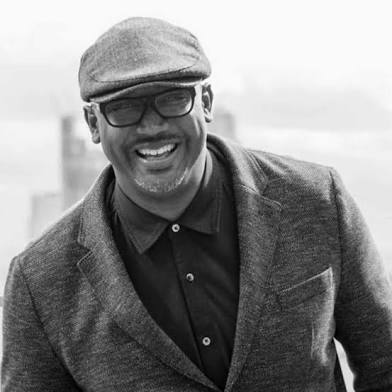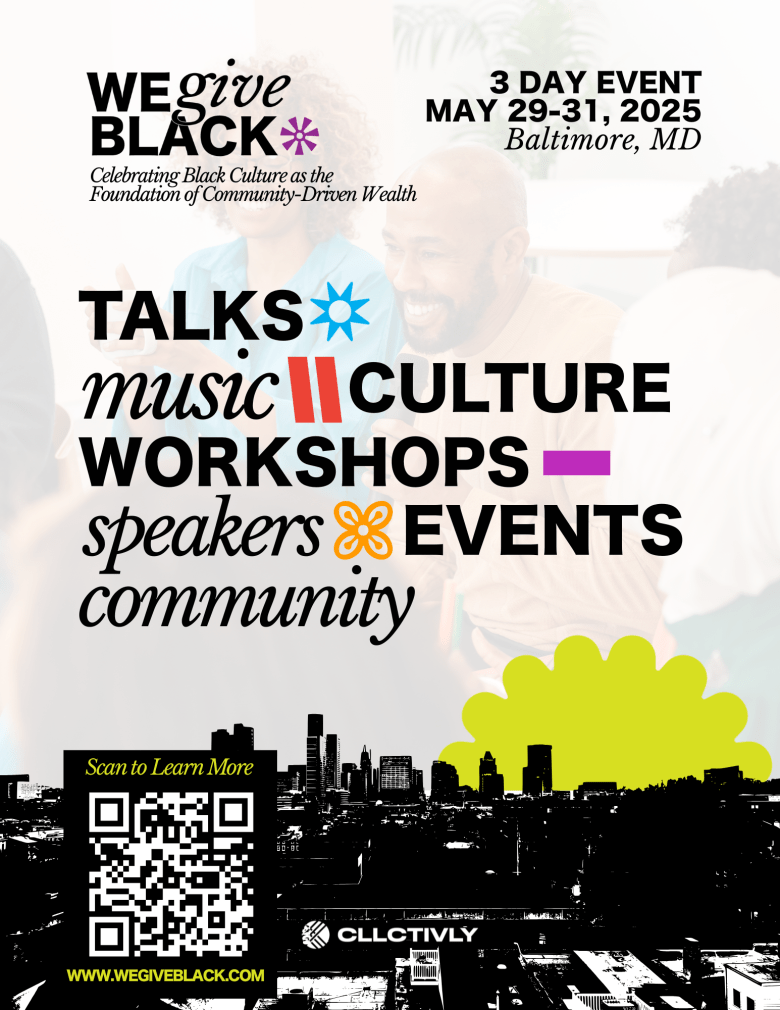Entrepreneur Jamye Wooten’s mission is to help Black-led business owners in Baltimore forge their own destinies.
Wooten, 52, is a Baltimore native. He grew up in the Irvington community in Southwest Baltimore and then moved to the West Hills community. Wooten’s father Palmer owned five dry-cleaning businesses as well as several night clubs, his mother Janice was a florist, and his sister Sherri owns a pizza shop in East Baltimore. Coming from a family of business owners influenced his own desire to give back to the community.
“My dad sponsored softball teams, basketball teams…through his business,” Wooten said. “And so that was deeply rooted in me. And I just love Baltimore. I think it’s a town with so many folks that are giving back to the community, but yet we haven’t necessarily invested in them.”
To that point, from May 29-31, Wooten’s organization CLLCTIVLY will host We Give Black, a three-day gathering featuring storytelling sessions, workshops, and performances across the city.
“We Give Black recognizes culture as capital—our stories, healing traditions and ancestral wisdom are true abundance. We’re revitalizing a legacy of communal power,” Wooten said.
Wooten’s journey to supporting Black entrepreneurship in Baltimore took a winding path.

Wooten graduated from Woodlawn High School before going to Dickinson College in Pennsylvania. He attended London Academy in the United Kingdom for his MBA, studied at UMBC, and has been a fellow at Princeton University, Boston University, and Duke University.
Initially, he intended to study hotel, restaurant, and tourism management at UMBC but after he took a class in political science, everything changed. He created a degree program in interdisciplinary studies that combines Africana studies and financial economics into a degree program called Pan African development.
Wooten had been conducting national work focused on digital strategy and movement building from Ferguson to the Congo. After the killing of Freddie Gray in 2015, he came back from the Congo to the United States and co-founded Baltimore United for Change with grassroots organizations Leaders of a Beautiful Black Struggle, The Black Church Food Security Network, The Algebra Project, and others. In 2019, Wooten and those organizations launched CLLCTIVLY, a coalition of grassroots activists and concerned citizens that awards grants to Black-led businesses in Baltimore.
“Part of it was looking at the ways in which, again, Black-led organizations have historically been disinvested, underfunded. And we wanted to be somewhat disruptive,” Wooten said. “It wasn’t a big grant. It’s a $1,000 grant. Happens every month. Organizations submit a two- to three-minute video, and the community at large would vote. And now we’ve had over 110,000 people vote.”
Since its launch, the group has gone from awarding $1,000 micro grants to $75,000 grants, to now awarding close to $4 million in no-strings-attached grants to support Black-led organizations in Baltimore.
Wooten said his organization focuses on three parts: give, amplify, and imagine. “Give” refers to resource mobilization, from crowdfunding and grant-making to support organizations whether they are for profit non profit or community based organizations with no legal structure, but have impact within the community. “Amplify” is about uplifting and boosting stories of Black organizations. “Imagine” is primarily about learning and convening, Wooten said.
Wooten said this spirit of entrepreneurship came from him witnessing the work his parents did, and learning from the history of philanthropy within Baltimore. It was by doing this Wooten said he realized traditional philanthropy wasn’t going to fund or sustain their work.
“Here in Baltimore, I think there’s a long history of something called social entrepreneurship, where folks have been mission-driven, but also knew they needed revenue-based models to support and sustain their work,” Wooten said. “I think often in the nonprofit world, you are starting with a problem, you’re defining your community as a problem, and then you’re trying to sort of respond to that. I think from an entrepreneurial standpoint, we can be much more if we can stay in the space of innovation.”
Wooten said that while he sees a lot of entrepreneurship in the city, there is not a lot of investment. He said he hopes to even the playing field so that Black-led businesses will have the same opportunities that others do. This means that they should have the opportunity to afford failure—should it happen.
“So even having the risk capital, the ability to fail and not feel like a failure, the ability to risk, right?” Wooten said. “Because for everyone else, they’re learning, they’re innovating, and they’re learning, and they’re iterating. They’re not failing. They’re using even that million dollar loss.”
Something that separates Wooten’s organization from other investment groups is that their money comes with no strings attached.
Something that separates Wooten’s organization from other investment groups is that their money comes with no strings attached. He defined it as putting people before projects and programs. Wooten said that people should be able to do things like pay their rent or treat themselves to a spa day. He said he wants the people who receive this money to not just survive but thrive.
Wooten said that the organization is a disruptor by going against what donations and philanthropy typically look like. This comes from how much of the money is driven by what the community wants.
“And so the disruption is handing over that decision-making power to the community,” Wooten said. “For the community to decide for themselves what are the priorities, and how we disseminate resources.”

